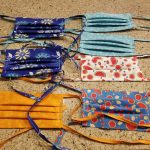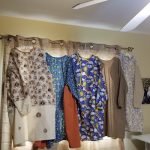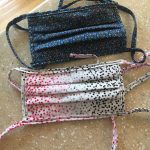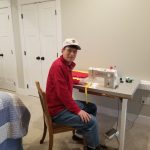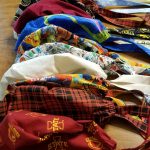Engineering faculty and staff work every day towards improving the lives of others and, even in these unprecedented circumstances, their urge to help continues on. Many members of the Cyclone Engineering community made and donated PPE, from face shields to desk shields to cloth masks. Here are the stories of three engineering faculty and staff who made and shared masks with those around them.
Using engineering problem-solving skills to make masks
Agricultural and biosystems engineering assistant teaching professor, Russ Hoffman’s road to making masks started with repairing a sailboat sail a few years ago. Hoffman owns a few industrial sewing machines, propelling him into making a multitude of fabric masks for others this spring.
Making masks required Hoffman to be a creative problem solver, as engineers are. For example, Hoffman tried to buy a three-quarter inch fabric tape maker but was unsuccessful in locating one. He ended up creating one by combining stiff paper and several pins.
Hoffman crafted masks for his family, friends, people in the Department of Agricultural and Biosystems Engineering and Department of Mechanical Engineering, employees of machine and metal supply industry businesses and a local chiropractic office.
“I was asked by business owners in the machine supply and metalworking industries for their employees’ masks. These are businesses that most people making masks are unlikely to know about,” Hoffman said.
Making masks has allowed faculty to take their engineering skills and apply them differently. For Russell, he started making masks and found it shortly turned into trying to find the most efficient way of making them.
While Hoffman moved from creating in the lab to his home, the engineering core values remained the same.
Hoffman said, “I frequently tell my students that we’re all measured by the all-mighty dollar. With that in mind, making masks is no exception so, pattern layout – that is figuring out how to most efficiently nest the parts on the fabric to yield the most number of masks per yard with the least amount of waste took up a few hours of my time but well worth the time spent, I nearly doubled my production output compared to when I was experimenting.”
Longtime hobby into a helpful tool to share
Steve Martin, Distinguished Professor of materials science and engineering, has sewn all his life (he’s made close to 50 quilts) – and this spring used his lifelong hobby to make masks for his family, friends, neighbors, coworkers, students, or basically anyone who asks.
When Martin realized mask making was a way he would help those around him, he started making his all-cotton masks with fabric he had on hand. People then donated fabric and thread to help him continue his production.
According to Martin, it’s no surprise engineers started sewing masks because there’s a direct correlation between sewing and engineering.
“Sewing is all engineering, dimensions, quality assurance, mechanical strength, filtration,” said Martin.
Plus, learning to make the masks required engineers’ trademark problem-solving and process improvement. While the colors and fabric of the masks varied, the process remained the same.
For Martin, he was able to do what he loves, sew, and help others around him.
“Sewing is woodworking without all of the sawdust, sanding, staining, and finishing, and besides, when you are ready for something new, you fold up your sewing project and put it in a drawer,” said Martin.
Propelled forward by a Facebook group
During Lea Henderson’s, College of Engineering Administration program coordinator, time away from Marston Hall where she works, she has handmade over 750 masks, 100 scrub caps and 25 isolation gowns. As the weeks go on, the numbers will keep growing.
Henderson is a longtime sewist and started making masks in March using the material from her stash and scraps. Initially, Henderson set the goal of 200, making her first 100 masks for Bethany Life Nursing Home. She quickly surpassed that goal when she came across of Facebook group dedicated to getting masks to frontline workers.
“I soon found the Facebook site of Masks for the Frontlines Iowa. They are a group in which organizations and businesses submit a request and volunteers across Iowa sign up to make what they can for them. I joined this group and now make masks and scrub caps through requests submitted to this group. I have made masks and/or scrub caps for hospitals, dentist offices, mental health facilities, hotels, medical clinics, animal shelters and, of course, nursing homes,” Henderson said.
Henderson has been sewing for over 55 years and has a large stash of saved scraps from her and her mother’s years of sewing. When Henderson’s scraps become too small for her to use, she donates them to a fellow member of the Masks for the Frontlines group, who uses these smaller scrap pieces of fabric for other creative projects. To date, volunteers with Masks for the Frontlines have made over 115,000 masks for Iowans.
“It does my heart good to know that even my scraps, that are no longer useful in my projects, are being upcycled by someone,” Henderson said.
Just like hand sanitizer and cleaning supplies in short supply, the same is true for quarter-inch elastic. There were limits on the purchasable amount and long delivery waits for online orders. With a shortage of elastic and substitutes, Henderson said she relied on a member of the same Facebook group who generously shared elastic with her and kept the process moving forward.
Henderson said, “It was community at its best.”

